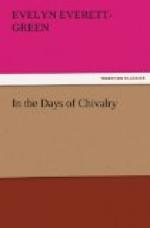“But now, I pray thee, tell me of thyself; for thou hast sadly altered since we parted last. What has befallen thee in these wars? and where is thy brother Gaston, whom thou wentest forth to seek? and where the faithful Roger, whose name thou hast spoken many times before?”
“I have left them together in the camp before Calais,” answered Raymond. “Roger would fain have come with me, but I thought it not well that he should place himself so near his ancient foes and masters, even though I trow the spell has been snapped once and for ever. He loves Gaston only second to me, and was persuaded at length to stay with him. I, too, would have stayed likewise, but they said the winter’s cold would kill me, and I could no longer bear arms or serve in the ranks. So I was fain to leave them and come to England with our uncle. And the thought of spending the winter months with thee and with the books made amends for all I left behind beneath the walls of Calais.”
“What ails thee then, Raymond? Is it some unhealed wound?”
The youth shook his head.
“Nay, I have no wound. It was some hurt I got in that last melee on the field of Crecy, when the Prince nearly lost his life just as the day was won. I was hurled to the ground and trampled upon. Methought for many long minutes that I should never rise again. But for days afterwards I knew not that the hurt was aught to think about or care for. It pained me to move or breathe, but I thought the pain would pass, and heeded it but little. We rode gaily enough to the walls of Calais, and we set about building a second city without its walls (when the governor refused to surrender it into our hands), which the King has been pleased to call Newtown the Bold. I strove to work with the rest, thinking that the pain I suffered would abate by active toil, and liking not to speak of it when many who had received grievous wounds were to be seen lending willing service in the task set us. But there came a day when I could no more. I could scarce creep to the tent which Gaston, Roger, and I shared together; and then I can remember naught but the agony of a terrible pain that never left me night or day, and I only longed that I might die and so find rest.”




